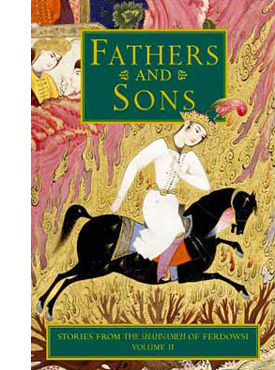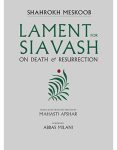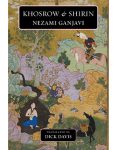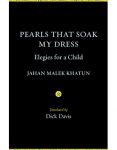About the Book
Volume II of our series containing the major stories from the Shahnameh opens and closes with tales of tragic conflict between a king and his son: Prince Seyavash and Prince Esfandiyar are both driven from the court by their foolish fathers to confront destiny and death in distant lands. Interwoven with Seyavash’s story is the tale of his stepmother Sudabeh’s lust for her young stepson, and of his escape from her tricks by the famous trial by fire; Esfandiyar’s story involves the last combat of the great Rostam, a fight to the death which leads to Rostam’s own demise at the hands of his evil brother Shaghad. Between these two stories the reader travels through a wondrous landscape of romance (Bizhan and Manizheh), demons (the Akvan Div), heroic despair (the tale of Forud) and mystical renunciation of the world (Kay Khosrow’s mysterious last journey).
Reviews
This splendid book is the second in a projected set of three volumes that will recount all the major events of the Persian national epic, the Shahnama or Book of Kings. Written in rhyming couplets by the poet Firdawsi and completed in about 1010, the epic runs to more than 40,000 lines. Volume 1, Ehsan Yarshater’s The Lion and the Throne (CH, May’98), was translated by Davis largely from an earlier Persian prose translation. Davis translated the present volume directly from the original text and presents it to the reader as a felicitous mixture of prose and verse. Fathers and Sons begins where volume 1 left off, recounting the epic from the legend of Seyavash to the death of Rostam, bringing to a close the purely legendary part of Shahnama. Davis provides an informative introduction as well as a translation that is a joy to read. This reviewer particularly welcomed an increased amount of verse in this volume. Aimed at a wide and varied audience, not exclusively academic, these volumes appeal to the eye as well as the ear. Like its predecessor, this volume is beautifully produced in every respect. Large academic and general libraries collecting Middle Eastern literature and cultural history.
— W. L. Hanaway, emeritus, University of Pennsylvania, Choice Magazine
This second volume of stories from the Persian national epic, Book of Kings” (Shahnameh, composed by the poet Ferdowsi between 980 and 1010 C.E.) is so beautifully produced and so exquisitely illustrated with 181 rare color miniature reproductions that it could be used for an art class. The stories themselves are fascination, as illustrated by the adventures of princes Seyavash and Esfandyar, whose respective fathers/kings push them to face the realities of life through extraordianry trials in faraway places. Probably the most famous story here, however, is not laden with violence but romance. It depicts the touching love story of Bizhan and Manizheh, who, like Romeo and Juliet, are the children of sworn enemies. In addition to the seven main sections, the useful introduction by translator Davis (Persian, Ohio State Univ.) gives some background to the Shahnameh and to Persian miniature art. A glossary of manes and their pronunciation as well as a guide to the illustrations providing provenance and other credits conclude the book. Highly recommended for all collections.
–Library Journal
Excerpt
Table of Contents
- Introduction
-
- The Legend of Seyavash
-
- Forud, the Son of Seyavash
-
- The Akvan Div 125 Bizhan and Manizheh
-
- The Occultation of Kay Khosrow
-
- Rostam and Esfandyar
-
-
- The Death of Rostam Appendices
-
Seyavash is Killed
Garsivaz and Gorui dragged him away from the army and the city to a wasteland on the plain. Gorui took the dagger from Garsivaz, and when they had reached the appointed place they threw the prince’s mammoth body to the ground. Knowing neither fear nor shame, they held a gold dish at his throat to catch the blood and severed the head of that silver cypress tree. The prince’s head sank into endless sleep, never to awake. Gorui took the dish to the place that Afrasyab had ordered, and emptied it. A wind rose up, and darkness obscured the sun and moon; people could not see one another’s faces, and all cursed Gorui.
- I turn to right and left, in all the earth
- I see no signs of justice, sense, or worth:
- A man does evil deeds, and all his days
- Are filled with luck and universal praise;
- Another’s good in all he does-he dies
- A wretched, broken man whom all despise.
Seyavash’s palace resounded with lamentation; his slaves cut off their hair, and Farigis too cut her musky tresses and bound them about her waist and clawed at her cheeks’ roses. Loudly she cursed Afrasyab, and when he heard her cries he ordered Garsivaz to drag her into the streets, and there to strip her and have her beaten, so that she would miscarry the seed of Iran, saying, “I want nothing to grow from Seyavash’s root, neither a tree nor a bough nor a leaf; I want no scion from him worthy of a crown or throne.”
About the Author
About the Translator
Dick Davis brings a unique array of gifts to the challenges of translating Hafez and his contemporaries. In his own right, he is a poet of great technical accomplishment and emotional depth. He is also the foremost English-speaking scholar of medieval Persian poetry now working in the West. Numerous honors testify to his talents. In the U.K., he received the Royal Society of Literature’s Heinemann Award for his second book of poems, Seeing the World, in 1981; his Selected Poems was chosen by both the Sunday Times and the Daily Telegraph as a Book of the Year in 1989; and his collection Belonging was selected as the Poetry Book of the Year by The Economist in 2003. In the U.S., A Kind of Love—the American edition of his Selected Poems—received the Ingram Merrill prize for “excellence in poetry” in 1993. He has received awards for his scholarship from the Arts Council of Great Britain, The British Institute of Persian Studies, and the Guggenheim Foundation, and he is the recipient of grants for his translations from the National Endowment for the Humanities and the National Endowment for the Arts. Twice, in 2000 and 2001, he received the Translation Award of the International Society for Iranian Studies, and in 2001 he received an Encyclopedia Iranica award for “services to Persian poetry.” His translation of Ferdowsi’s Shahnameh: the Persian Book of Kings was chosen as one of the “ten best books of 2006” by the Washington Post.
Davis read English at Cambridge, lived in Iran for eight years (he met and married his Iranian wife Afkham Darbandi there), then completed a PhD in Medieval Persian Literature at the University of Manchester. He has resided for extended periods in both Greece and Italy (his translations include works from Italian), and has taught at both the University of California and at Ohio State University, where he was for nine years Professor of Persian and Chair of the Department of Near Eastern Languages, retiring from that position in 2012. In all, he has published more than twenty books and is a Fellow of the Royal Society of Literature.
Among the qualities that distinguish his poetry and scholarship are exacting technical expertise and wide cultural sympathy—an ability to enter into distant cultural milieus both intellectually and emotionally. In choosing his volume of poems Belonging as a “Book of the Year” for 2006, The Economist praised it as “a profound and beautiful collection” that gave evidence of “a commitment to an ideal of civilized life shared by many cultures.” the Times Literary Supplement has called him “our finest translator of Persian poetry.” In 2009 Mage published a book of Dick Davis’s own poems about Iran: At Home and Far From Home: Poems on Iran and Persian Culture. His book about the Shahnameh, Epic and Sedition was published by Mage in paperback in 2006. His books of translations are: Borrowed Ware: Medieval Persian Epigrams (1998), The Shahnameh (2004); The Legend of Seyavash (2004); Rostam: Tales of Love and War from Persia’s Book of Kings (2007); Vis and Ramin (2008); Faces of Love: Hafez and the Poets of Shiraz (2012).









